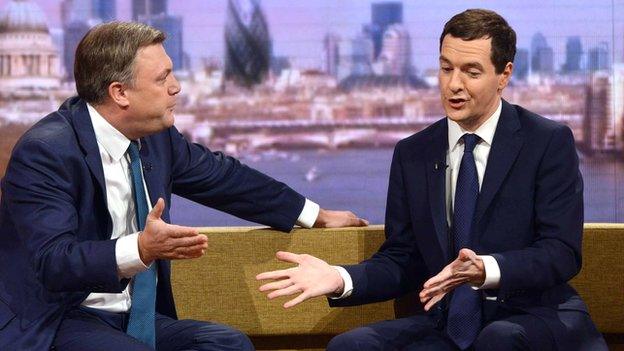Analysis: Osborne's political pitch
- Published

There was no smile on his face as he walked to his car at the Treasury. A sombre look. The economy is growing, unemployment is falling, inflation is low, but the message is this: these are still tough times.
One word explains why - debt. Borrowing is up - more this year than was predicted - and the deficit is nowhere near being dealt with. In spite of the chancellor's hopes back in 2010, the job's not done.
He admitted as much at the very beginning saying "the deficit remains too high". That much is obvious.
But in a statement rich with transport metaphors, George Osborne said the government will "stay the course" in its deficit strategy. That was pure politics too, a plea to voters: stay the course with us, the Tories.
But austerity continues. The chancellor told MPs he was announcing measures to tighten government spending, not the fiscally neutral plan most expected. He said welfare spending cuts, among other things, have helped the government deal with slower growth in tax revenue. And he made it clear that he believes they must continue after 2015 if the UK can meet his target of a budget surplus by 2020.
So more public pay restraint, the welfare cap and a further £10bn in 'efficiencies' to come from government departments. Add to that a commitment to find a further £5bn by clamping down - again - on tax avoidance. There was a big move on the banks and the corporate tax avoiders, in the name of fairness.
All of which helped the chancellor utter his mantra, again: "We're all in this together".
He was helped in that - and this was the crucial politics of this statement from a very political chancellor - by a raft of changes to help lower earners. Income tax thresholds will rise again, taking more people out of tax.
And top of the bill was an overhaul to stamp duty, aimed at helping people buy less expensive houses and hitting those - 2% he claimed - at the top, who will pay more. The change is immediate. He will hope that appeals to voters as the election approaches and also take the wind from Labour's sails on their plans for what's been called a "mansion tax".
Couple that with moves to tackle big corporate tax avoidance and hit the banks again for more tax and you have an offering that looks, to some, like a Conservative Party, and a prime minister, trying to tackle the claim of being out of touch and for the rich.
But that is looking forward. There's no escaping the fact that the government's record of what it's achieved so far is where its credibility is most vulnerable.
The deficit remains stubbornly high - the government is only half way through doing what it said it would complete by next year - and government borrowing is higher than forecast in the spring.
Labour repeated that with laser-like focus, dismissing the measures announced as "diversionary tactics" and "a stunt".
The shadow chancellor insisted "people are worse off"' as he attacked this final coalition Autumn Statement.
The job now for Labour is to digest and hastily try to deconstruct what George Osborne unveiled.
The theme for the opposition remains what it has been for some time: the UK's recovery is rooted in low-paying jobs and the benefits are not being felt universally.
Alongside that, there's no doubt Labour retains a less optimistic outlook, which Ed Balls rammed home when he pointed to downwardly-revised figures for growth in the UK economy after next year.